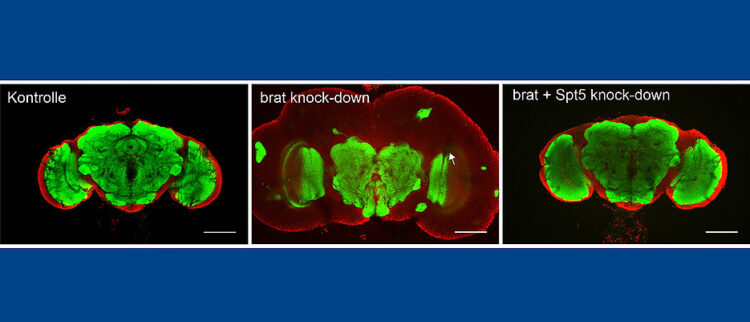A Potential Target for New Anti-Cancer Agents

Brains of three-day-old adult flies. Left: Healthy specimens. Center: animals with a brain tumor. Right: Brain tumor after reduction of SPT5 levels. Green coloring shows central brain regions. Red coloring shows the cerebral cortex, which is strongly expanded by the tumor.
Image: AG Raabe
MYC proteins play an important role in many types of cancer. A research team at the University of Würzburg has now succeeded in indirectly influencing these proteins – with clear consequences for the tumor.
MYC family genes are essential for the human organism. According to current knowledge, they regulate the expression of most cellular genes. Misregulation of MYC proteins significantly contributes to the development of many types of cancer. Unsurprisingly, MYC proteins are in the focus of cancer research worldwide. From a scientific point of view, they could be the ideal anti-cancer targets.
Indeed, the importance of MYC for the development of cancer cells has been known for a long time. However, the structure of MYC proteins and their molecular function have so far prevented direct pharmacological targeting of the protein. In search of a solution to this problem, a research team from the Julius-Maximilians-Universität Würzburg (JMU) may now have succeeded in taking a possibly important step: by targeting a cooperation partner of MYC they were able to significantly slow down the formation and development of MYC-dependent cancer tumors in animal experiments.
Publication in “Life Science Alliance”
Two research groups at JMU’s Chair of Biochemistry and Molecular Biology led by Elmar Wolf, Professor of Tumor Systems Biology, and Dr. Peter Gallant, respectively, as well as the group led by Thomas Raabe, Professor of Molecular Genetics, were involved in this study. The scientists have now published the results of their work in the journal “Life Science Alliance”.
“Because it is so difficult to attack MYC proteins directly, we were looking for partners of MYC and found a protein called SPT5”, Elmar Wolf describes the preliminary work for this study. SPT5 turned out to be indispensable for MYC-dependent gene transcription in human cancer cells in cell culture. However, it remained unclear how important the interaction of MYC and SPT5 proteins is for the behavior of normal cells in the body, and whether it could be utilized to influence the development of cancer cells.
Research on the fruit fly
The current study now provides some answers. “We worked with the fruit fly Drosophila melanogaster – a tried and tested model system of animal development”, explains Peter Gallant. Just like vertebrates – and thus also humans – fruit flies possess MYC and SPT5 proteins.
In their experiments, the scientists first of all were able to demonstrate that MYC and SPT5 proteins also functionally cooperate in the organism. For example, a moderate change in the amount of MYC or SPT5 was well tolerated by the flies. However, when the team altered both MYC and SPT5 amounts at the same time, significant defects became visible in the animals. “These observations underline the importance of the MYC-SPT5 interaction during normal organismal development,” says Thomas Raabe.
Drastic reduction of tumor mass
Next, the research team investigated the role of SPT5 in the formation and development of tumors. For this purpose, they used fruit flies that were genetically modified to develop MYC-dependent brain tumors. These flies were able to hatch but died within less than ten days, whereas most of the control animals were still alive after two months.
“However, when we experimentally reduced the amount of SPT5 in the brain tumors of these specimens, their lifespan tripled,” Peter Gallant describes the key finding of the study. This was accompanied by a dramatic decrease in tumor mass, which was, however, only transient. The lifespan also increased when the scientists reduced the amount of SPT5 not only in the tissue of the brain tumors, but in the entire organism of the fly. Analogous manipulations of SPT5 in healthy control animals had only negligible effects on the brain structure and survival of the animals.
According to the view of the Würzburg research groups, these results show that SPT5 plays an important role in the development of MYC-dependent tumors. Their experiments also suggest that a moderate reduction of SPT5 levels is well tolerated in healthy tissue, but can lead to a significant regression of tumors. This highlights SPT5 as a possible target protein for the development of pharmacological inhibitors for cancer treatment.
Wissenschaftliche Ansprechpartner:
Dr. Peter Gallant, Chair of Biochemistry and Molecular Biology, peter.gallant@uni-wuerzburg.de
Originalpublikation:
Spt5 interacts genetically with Myc and is limiting for brain tumor growth in Drosophila. Julia Hofstetter, Ayoola Ogunleye, André Kutschke, Lisa Marie Buchholz, Elmar Wolf, Thomas Raabe, Peter Gallant. Life Science Alliance Vol 7, Issue 1; doi: 10.26508/lsa.202302130.
https://www.uni-wuerzburg.de/en/news-and-events/news/detail/news/new-anti-cancer-agents/
Media Contact
All latest news from the category: Life Sciences and Chemistry
Articles and reports from the Life Sciences and chemistry area deal with applied and basic research into modern biology, chemistry and human medicine.
Valuable information can be found on a range of life sciences fields including bacteriology, biochemistry, bionics, bioinformatics, biophysics, biotechnology, genetics, geobotany, human biology, marine biology, microbiology, molecular biology, cellular biology, zoology, bioinorganic chemistry, microchemistry and environmental chemistry.
Newest articles

Hyperspectral imaging lidar system achieves remote plastic identification
New technology could remotely identify various types of plastics, offering a valuable tool for future monitoring and analysis of oceanic plastic pollution. Researchers have developed a new hyperspectral Raman imaging…

SwRI awarded $26 million to develop NOAA magnetometers
SW-MAG data will help NOAA predict, mitigate the effects of space weather. NASA and the National Oceanic and Atmospheric Administration (NOAA) recently awarded Southwest Research Institute a $26 million contract…

Protein that helps cancer cells dodge CAR T cell therapy
Discovery could lead to new treatments for blood cancer patients currently facing limited options. Scientists at City of Hope®, one of the largest and most advanced cancer research and treatment…



